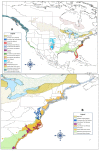North American wetlands and mosquito control
- PMID: 23222252
- PMCID: PMC3546777
- DOI: 10.3390/ijerph9124537
North American wetlands and mosquito control
Abstract
Wetlands are valuable habitats that provide important social, economic, and ecological services such as flood control, water quality improvement, carbon sequestration, pollutant removal, and primary/secondary production export to terrestrial and aquatic food chains. There is disagreement about the need for mosquito control in wetlands and about the techniques utilized for mosquito abatement and their impacts upon wetlands ecosystems. Mosquito control in wetlands is a complex issue influenced by numerous factors, including many hard to quantify elements such as human perceptions, cultural predispositions, and political climate. In spite of considerable progress during the last decades, habitat protection and environmentally sound habitat management still remain inextricably tied to politics and economics. Furthermore, the connections are often complex, and occur at several levels, ranging from local businesses and politicians, to national governments and multinational institutions. Education is the key to lasting wetlands conservation. Integrated mosquito abatement strategies incorporate many approaches and practicable options, as described herein, and need to be well-defined, effective, and ecologically and economically sound for the wetland type and for the mosquito species of concern. The approach will certainly differ in response to disease outbreaks caused by mosquito-vectored pathogens versus quality of life issues caused by nuisance-biting mosquitoes. In this contribution, we provide an overview of the ecological setting and context for mosquito control in wetlands, present pertinent information on wetlands mosquitoes, review the mosquito abatement options available for current wetlands managers and mosquito control professionals, and outline some necessary considerations when devising mosquito control strategies. Although the emphasis is on North American wetlands, most of the material is applicable to wetlands everywhere.
Figures




References
-
- Mulrennan J.A. Mosquito control—Its impact on the growth and development of Florida. J. Fl. Med. Assoc. 1986;73:310–311. - PubMed
-
- Maartens F, Sharp B., Curtis B., Mthembu J., Hatting I. The impact of malaria control on perceptions of tourists and tourism operators concerning malaria prevalence in KwaZulu-Natal, 1999/2000 versus 2002/2003. Int. Soc. Travel Med. 2007;14:96–104. doi: 10.1111/j.1708-8305.2006.00086.x. - DOI - PubMed
-
- Simmons F.E.R., Peng Z. Skeeter syndrome. J. Allergy Clin. Immunol. 1999;104:705–707. - PubMed
-
- Peng Z.K., Beckett A.N., Engler R.J. Immune responses to mosquito saliva in 14 individuals with acute systemic allergic reactions to mosquito bites. J. Allergy Clin. Immunol. 2004;144:1189–1194. - PubMed

